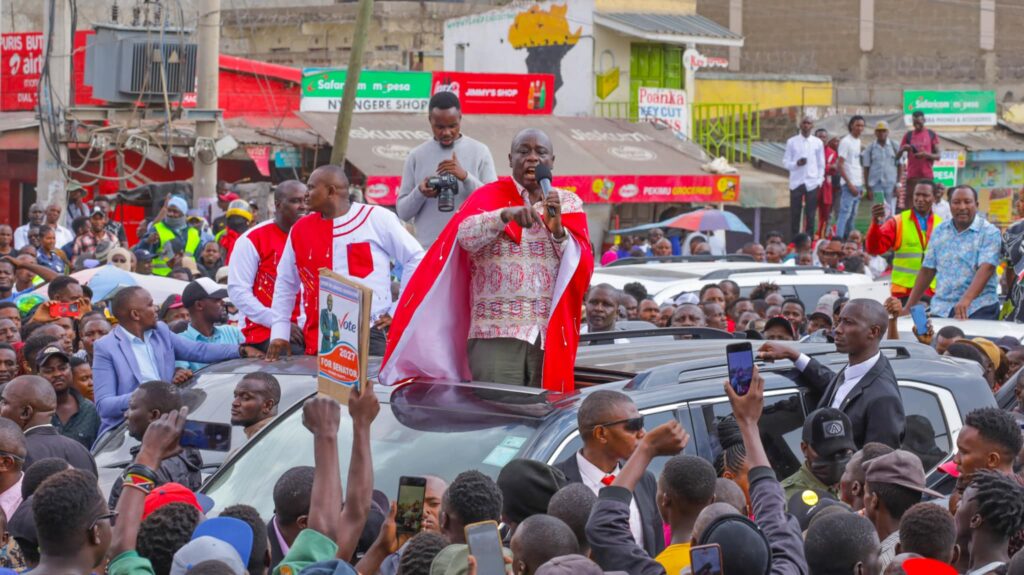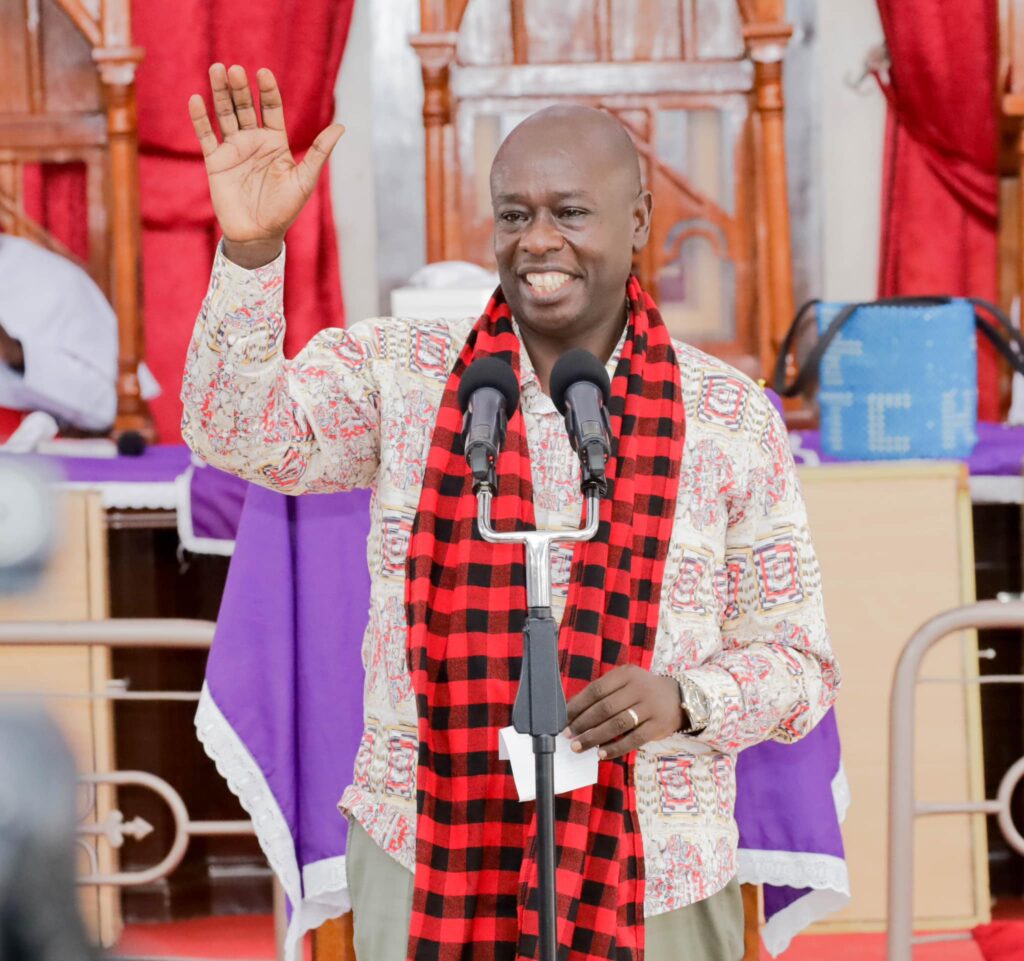
Deputy President Rigathi Gachagua has voiced strong opposition to President William Ruto’s recent political maneuvers, particularly the removal of his allies from key parliamentary committee positions. In a bold statement during a sunday Service in Kitengela, Gachagua urged the President to halt the purge, arguing that many of the ousted leaders played a crucial role in securing Ruto’s victory in the last general elections.
Gachagua’s remarks signal growing tensions within the Kenya Kwanza government, raising questions about potential realignments in the country’s political landscape. Speaking during a church service at ACK Holy Trinity Kitengela Church in Kajiado County, Gachagua also criticized the government on various policy issues, including infrastructure projects, security concerns, and the alleged sale of Bomas of Kenya.
His statements have sparked debate among political analysts and the public, with many wondering whether Kenya Kwanza is heading toward an internal split. While some see Gachagua’s defiance as an attempt to position himself as a potential alternative leader, others argue that his comments reflect deep-seated frustrations within the ruling coalition.
Rigathi Gachagua’s Opposition to the Purge of Political Allies
Former DP Rigathi Gachagua openly condemned the President’s decision to remove his loyalists from influential parliamentary committees, stating that these individuals were instrumental in Ruto’s electoral success.
“It is unfair to sideline those who stood with you when you needed them most,” Gachagua said. He expressed shock that even some leaders from his home region, Mount Kenya, were supporting the move, warning that such actions could erode political trust and unity within Kenya Kwanza.
This public outcry highlights a brewing conflict between the President and his Deputy, with Gachagua appearing to consolidate his support base in anticipation of a possible political showdown. Political observers note that such a move could lead to further divisions within the ruling party, particularly if Gachagua’s supporters begin to rally behind his call for fairness and recognition.
Riagthi Gachagua’s Criticism of Government Priorities

Gachagua took issue with the government’s prioritization of projects, arguing that secondary needs should not take precedence over basic necessities like water and roads. This was a direct critique of the ongoing housing project, which he suggested was being pursued at the expense of more pressing issues.
“The government must get its priorities right. Before we focus on housing, let us first ensure that our people have access to clean water and good roads,” he stated.
His remarks suggest a divergence in policy perspectives between him and President Ruto, with Gachagua positioning himself as an advocate for grassroots concerns. Some critics argue that while affordable housing is a crucial initiative, the government’s focus should be on immediate needs that directly impact livelihoods, such as healthcare, education, and job creation.
The Deputy President’s stance has resonated with sections of the public, particularly those in rural areas where infrastructure remains underdeveloped. His comments reflect the frustrations of many Kenyans who feel that the government’s priorities do not align with their day-to-day struggles.
Gachagua’s Condemnation of Abductions and Extrajudicial Killings
One of the most serious allegations leveled by Rigathi Gachagua was his condemnation of the recent wave of abductions and extrajudicial killings. He cited Kitengela as one of the most affected areas, referencing an incident where three young men were found dead after being abducted by unknown individuals.
“The Kenya Kwanza administration must understand that Kenyans will not forgive them for killing young people,” Gachagua warned.
Rigathi Gachagua’s comments reflect growing public concern over security issues and suggest that he is positioning himself as a defender of human rights and justice. Extrajudicial killings have long been a controversial issue in Kenya, with previous administrations accused of failing to curb police excesses. If Gachagua’s accusations hold weight, they could further strain relations between the government and human rights organizations.
Some political leaders believe that by raising these security concerns, Gachagua is attempting to appeal to younger voters and human rights advocates. If the issue continues to gain traction, it could become a major talking point in Kenya’s political discourse, forcing the government to take definitive action.
Gachagua’s Allegations on the Sale of Bomas of Kenya
Rigathi Gachagua also criticized Ruto’s government for allegedly selling Bomas of Kenya to a Turkish national. He argued that disposing of such critical infrastructure posed a significant security risk, particularly to Wilson Airport’s flight path.
“This is a national treasure, and selling it to foreign interests threatens our sovereignty and security,” he stated.
Although the government has not officially commented on these claims, Gachagua’s remarks add to the growing narrative that key state assets are being mismanaged under Ruto’s administration. If true, the sale of Bomas of Kenya could spark national outrage, given its historical and cultural significance.
Various Government officials have since dismissed these allegations as misinformation, but the lack of transparency surrounding the management of public assets continues to fuel speculation. The coming weeks may see further scrutiny on this issue, with demands for accountability growing louder.
Political Ambitions and Formation of a New Party
In a move that signals his growing political ambitions, Rigathi Gachagua announced that he is in the process of forming a new political party. He assured his followers that he would soon launch the party, whose main objective would be to challenge and eventually remove the current government from power.
“I ask my supporters to remain patient as we finalize preparations. Our mission is clear: to take the government out of power,” he declared.
This development suggests that Rigathi Gachagua is laying the groundwork for an independent political path, possibly distancing himself from Ruto ahead of future elections. If Gachagua follows through with the party’s formation, it could dramatically reshape Kenya’s political landscape, especially in Mount Kenya, where he has a strong following.
Gachagua’s move to create his own political entity could attract disgruntled members of Kenya Kwanza and the opposition who feel alienated by the current administration. However, it also presents challenges, as breaking away from an incumbent government often requires significant political capital and grassroots support.
Rigathi Gachagua’s recent statements mark a significant escalation in political tensions within Kenya Kwanza. His opposition to the purge of political allies, criticism of government priorities, and allegations regarding extrajudicial killings and asset sales paint a picture of an administration at odds with itself. His announcement of a new political party further solidifies speculation that he is preparing for a major political battle in the coming years.
As Kenya’s political landscape continues to evolve, the rift between Ruto and Gachagua continues to widen. Whether this leads to a full-fledged political breakup or strategic repositioning remains to be seen. One thing is clear—Kenyan politics remains as unpredictable as ever.https://touchdigitalnews.com/kimani-ichungwah-fiery-interview-with-mehdi-hassan/
Gachagua’s next moves will be crucial in determining the direction of this political standoff. Will he consolidate his base and emerge as a formidable opposition leader, or will he reconcile with Ruto and realign his ambitions? Only time will tell, but for now, his defiance has set the stage for what could be Kenya’s next major political realignment.